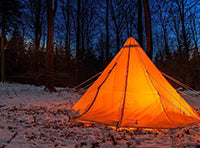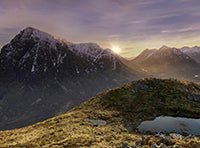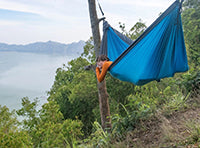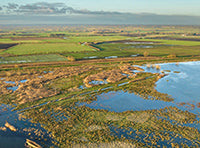This question is one of the first things that many would-be wild campers ask. Depending on where you are and what you are actually doing, the answer can be a yes (with some qualifications) or a no. Technically, wild camping cannot be 'illegal', since it is not subject to criminal law. However, in most parts of the UK it is an offence (but not a crime) to wild camp unless you have been granted permission by the landowner. If you pitch up without such permission, you are considered to be trespassing.
Although this sounds scary, trespass is not a criminal offence, but a civil one. This means that by trespassing alone, you cannot be arrested. However, if you cause damage while trespassing, this could become a criminal offence. Similarly, if you do not immediately leave when directed to do so by the landowner or somebody acting on their behalf (such as a gamekeeper or security guard) and you are "intentionally obstructing, disrupting, or intimidating others from carrying out lawful activities", then you may be committing a criminal offence (Aggravated Trespass), which a police officer could arrest you for. There are also a few areas where you will be immediately committing criminal trespass if you enter that land – such as railway lines, military sites and other restricted areas, including some education establishments. What this all means in practice is that if you wild camp without seeking permission from the landowner, they are well within their rights to ask you to move on, but the police would not assist in the matter unless you are committing a criminal act.
So why not just seek permission from the landowner? While this sounds like a sensible thing to do, in practice it can be pretty challenging. Firstly, it can actually be fairly difficult to find out who owns a specific piece of land. And the nature of wild camping often means you won’t know where you are going to pitch up on any given night, especially if you’re walking in an upland area, when most people simply put the tent up when their legs have had enough or you start to lose the light.
So, in the absence of the landowner’s permission, throughout most of the UK, if you want to pitch your tent you need be comfortable with the fact that you are trespassing. You also need to be aware that you might be asked to move on. While this can be irritating, in our experience it very rarely happens. But if you do get asked to move on, respect the landowners’ rights and move off their land quickly.
Having said all that, there are some places in the UK where wild camping is permitted, within certain guidelines and restrictions.
Access rights in Scotland are very different to those in England and Wales. Scotland is lucky enough to enjoy world-class access rights to most land, thanks to the 2003 Land Reform Act (Scotland). One of the guiding principles of the Land Reform Act was that everyone has the right of access to the land and inland water of Scotland for recreation so long as they do so responsibly and without impinging on the rights and freedoms of others. This access encompasses a whole host of activities, including camping. There are a few exceptions (such as certain stretches of the shores of Loch Lomond, where local byelaws prohibit wild camping), but the vast majority of land is freely available for people to pitch up, provided you adhere to the Scottish Outdoor Access Code. The access code states that where camping is lightweight, done in small numbers and only for two or three nights, you can wild camp wherever access rights apply. However, you must not camp in enclosed fields containing crops or livestock, and keep away from buildings, roads or historic structures. Similarly, you can’t camp in a stranger’s garden, nor in an urban park in a city centre.
Uniquely in England and Wales, backpackers are allowed to wild camp for one or two nights in some areas of the Dartmoor National Park, as long as you follow a ‘no impact’ approach. This permission doesn’t apply across the entirety of the park, so you do need to be careful to pick a spot where wild camping is permitted, but the National Park helpfully hosts an interactive map on its website, clearly showing the areas that you can and can’t camp.
While wild camping in the Lake District is not legal per se, the national park authority acknowledges that there is a tradition of wild camping in the Lakes and that it has often been tolerated, provided people camp above the highest fell wall, well away from towns and villages, only stay for a single night and leave no trace. As a National Park Authority they do not have the power to permit camping on private land, and they do not allow camping on the land they own either, but the implication is that as long as you act responsibly, no one is likely to move you on.
Officially, wild camping is not legal in any of the other national parks in England and Wales (except in parts of Dartmoor as noted above). As with the Lake District, however, there is a strong tradition of wild camping in many areas, including places such as Snowdonia and the Brecon Beacons, and many people do wild camp within these areas without experiencing any issues. It is more practicable to camp in some national parks than others, mostly because of the relatively low population density and remoteness of certain landscapes.
Wherever you decide to camp, however, you should follow all our wild camping guidance about selecting a suitable pitch and abiding by leave no trace principles.














